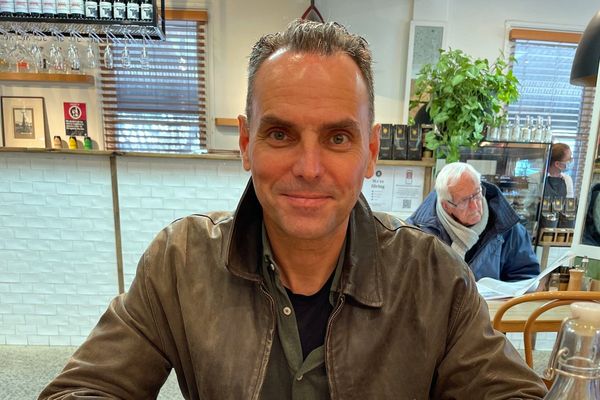
Hedge fund managers beware, the chair of the Treasury committee, Harriett Baldwin, wants to see you in parliament – to explain to her why the industry promotes so few women into senior positions.
Earlier this year, a Europe-wide study found that men filled 90% of all senior roles at hedge funds. Baldwin is keen to understand why.
The accusations of sexual harassment made this summer against one of the industry’s titans, Crispin Odey, have added to the concerns that male domination at the top of the industry is a profound problem.
The committee is contacting hedge fund executives and inviting them to attend the next hearing, says Baldwin, though the furore surrounding Odey, who denies any wrongdoing, may deter some of the industry’s top brass.
But Baldwin, 63, is not one to be put off by expensive suits and well-drilled responses. Before being elected as Conservative MP for West Worcestershire in 2010, she spent two decades as a currency trader and, later, a pension fund manager. She worked at the American bank JP Morgan, on Wall Street and in London, overseeing billions of pounds of pension savings.
This week she will formally launch a review of the finance available to small and medium-sized companies in a depressed economy where inflation and interest rates are high. This will run in parallel with the committee’s sexism in the City inquiry.
Connecting the two, she points out that for every £1 raised by venture capital firms for investment, only 2p goes to businesses run by women.
Baldwin’s own experiences would make excellent evidence for her committee. Speaking from her wood-panelled office in Portcullis House, opposite the Palace of Westminster, she has some shocking tales to tell of sexism in the City, citing pay bias and inappropriate behaviour by senior managers while she was at JP Morgan.
Early on in her City career, Baldwin says, she was working on a dealing room floor at the end of “a very active day in the markets”. With only a male colleague as a witness, “the big American boss came out and said: ‘The only difference between here and Las Vegas is that in Vegas the women wear short skirts.’ Then he came over to me and lifted my skirt right up.
“I was in my 20s and this was the big boss – my boss’s boss’s boss. What are you going to do? I could never look him in the eye again. I didn’t punch him, though I probably would these days. No one would dare or even want to do that now.
“I put in for a transfer to another part of the firm. Lots of people would leave or walk out after an experience like that, that so undermines your confidence.”
A shift to fund management put an end to the overt sexual harassment she encountered, but, she says, she experienced other kinds of discrimination.
“The glass ceiling I encountered was after maternity leave,” she says. “I took 14 weeks off and came back into my senior role. I was one of only 11% of managers in my firm who were women in those days. And never before had there been a woman return from maternity leave at the bank. Never.
“So I returned with no role models. I carried on doing my job. I performed very highly and when it got to the end of the year my boss said [she adopts a Yankee drawl], ‘OK Harriett, you’ve had a fantastic year, your portfolios have performed really well, you’ve increased the size of your assets under management, and in a normal year your bonus would have gone up very substantially. But you did take those 14 weeks’ maternity leave, and so I am cutting your bonus back’.
“I looked him in the eyes and said, ‘Get HR in here, now.’ It was just so appalling. You wonder why so many women never returned and stayed on as investment managers.”
The human resources people were able to maintain her bonus, though with a 14-week pro-rata cut. Her usual bonus calculation resumed in the following years.
Asked for a comment, a spokesperson for JP Morgan said: “We do not tolerate discrimination, harassment or inappropriate or abusive conduct of any kind.”

Baldwin is keen to stress that this not a personal crusade. “I don’t want to give the impression that the only reason we are doing this inquiry is because I had some bad experiences in the 1980s,” she says. “That is not the case. This was an inquiry other committee members wanted.”
And she is building on a similar report published in 2018. Then a review of City firms found only a smattering of women in executive roles across the finance industry. Recent witnesses called by Baldwin’s committee say that situation has not improved at all.
Baldwin’s early years were spent in England and Cyprus. Her parents met in Istanbul, but came back to the UK when she was born before jetting off again to Nicosia, where her father became head of the city’s English School. She spent her early childhood mingling with Greek and Turkish speakers before the island was divided. The family then moved back to rural Essex, where her father headed a local private school.
After attending the private Friends’ School in Saffron Walden, and then Marlborough College in Wiltshire, she won a place at Oxford to study French and Russian. She says it was a month she spent in Russia learning the language that convinced her capitalism was the better system, and she became a confirmed Tory.
“I wasn’t involved in politics at university,” she says. “I never thought I would end up in politics. But going to Moscow when it was still communist meant that I knew I believed in the opposite, in freedom, democracy and capitalism. There, everyone was equal, but equally miserable.”
She married and studied for an MBA at the prestigious McGill University in Montreal before joining JP Morgan Chase on Wall Street, later taking a post back in London with the same firm. She first stood for parliament in 2005 and though she lost, she nevertheless closed the gap with the opposition. This led to a successful selection for the safe Worcestershire seat she now holds.
In David Cameron’s government, she was a junior Treasury minister for a year before spending 18 months at the Ministry of Defence after Theresa May took charge. She then spent a further 18 months at the Foreign Office, as minister for Africa.
These days she backs Ukraine in its battle with Russia and is an ardent supporter of Nato. In the EU referendum she argued for remain, telling her constituents the UK had a unique semi-detached arrangement that was the best of both worlds.
Out of favour when Boris Johnson was in charge, Baldwin actively campaigned from the backbenches against Liz Truss as his successor. She supported Penny Mordaunt to keep Truss off the final ballot paper.
“It didn’t work out,” she says ruefully, before pausing, possibly to consider the disastrous consequences for the nation and her party of the Truss premiership.
“We all want to see the economy growing and tax cut,” she says. “But with inflation above 10%, it was the wrong time to follow her policies.”
Truss aside, Baldwin subscribes to the maxim adopted by former US secretary of state Madeleine Albright, who spoke of a special place in hell for women who don’t help other women.
“I have always cared passionately about this,” she says, “not just in business but now I am an MP. I want to see a 50:50 parliament in my lifetime. I really do.”
CV
Age 63
Family ‘Jim and I have three children from our previous marriages and three gorgeous grandchildren so far.’
Education MA in French and Russian at Oxford, then an MBA in international finance at McGill.
Pay £86,584 plus £17,354 to chair the committee.
Last holiday Lake District.
Best advice she’s been given ‘Get a good education.’
Biggest career mistake ‘I have no regrets.’
Phrase she overuses ‘Don’t worry about things you can’t change.’
How she relaxes Quizzes and puzzles.







